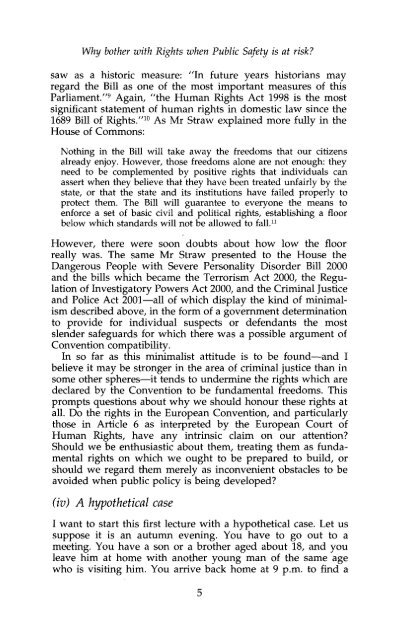Human Rights, Serious Crime and Criminal Procedure - College of ...
Human Rights, Serious Crime and Criminal Procedure - College of ...
Human Rights, Serious Crime and Criminal Procedure - College of ...
- No tags were found...
You also want an ePaper? Increase the reach of your titles
YUMPU automatically turns print PDFs into web optimized ePapers that Google loves.
Why bother with <strong>Rights</strong> when Public Safety is at risk?saw as a historic measure: "In future years historians mayregard the Bill as one <strong>of</strong> the most important measures <strong>of</strong> thisParliament." 9 Again, "the <strong>Human</strong> <strong>Rights</strong> Act 1998 is the mostsignificant statement <strong>of</strong> human rights in domestic law since the1689 Bill <strong>of</strong> <strong>Rights</strong>." 10 As Mr Straw explained more fully in theHouse <strong>of</strong> Commons:Nothing in the Bill will take away the freedoms that our citizensalready enjoy. However, those freedoms alone are not enough: theyneed to be complemented by positive rights that individuals canassert when they believe that they have been treated unfairly by thestate, or that the state <strong>and</strong> its institutions have failed properly toprotect them. The Bill will guarantee to everyone the means toenforce a set <strong>of</strong> basic civil <strong>and</strong> political rights, establishing a floorbelow which st<strong>and</strong>ards will not be allowed to fall. 11However, there were soon doubts about how low the floorreally was. The same Mr Straw presented to the House theDangerous People with Severe Personality Disorder Bill 2000<strong>and</strong> the bills which became the Terrorism Act 2000, the Regulation<strong>of</strong> Investigatory Powers Act 2000, <strong>and</strong> the <strong>Criminal</strong> Justice<strong>and</strong> Police Act 2001—all <strong>of</strong> which display the kind <strong>of</strong> minimalismdescribed above, in the form <strong>of</strong> a government determinationto provide for individual suspects or defendants the mostslender safeguards for which there was a possible argument <strong>of</strong>Convention compatibility.In so far as this minimalist attitude is to be found—<strong>and</strong> Ibelieve it may be stronger in the area <strong>of</strong> criminal justice than insome other spheres—it tends to undermine the rights which aredeclared by the Convention to be fundamental freedoms. Thisprompts questions about why we should honour these rights atall. Do the rights in the European Convention, <strong>and</strong> particularlythose in Article 6 as interpreted by the European Court <strong>of</strong><strong>Human</strong> <strong>Rights</strong>, have any intrinsic claim on our attention?Should we be enthusiastic about them, treating them as fundamentalrights on which we ought to be prepared to build, orshould we regard them merely as inconvenient obstacles to beavoided when public policy is being developed?(iv) A hypothetical caseI want to start this first lecture with a hypothetical case. Let ussuppose it is an autumn evening. You have to go out to ameeting. You have a son or a brother aged about 18, <strong>and</strong> youleave him at home with another young man <strong>of</strong> the same agewho is visiting him. You arrive back home at 9 p.m. to find a
















